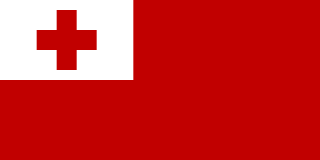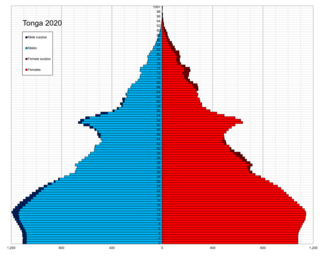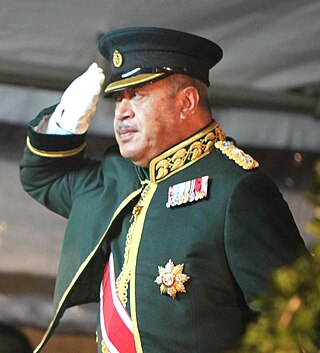Tongan may refer to:
- Something of, from, or related to the country of Tonga
- Tongans, people from Tonga
- Tongan language, the national language of Tonga
- Tong'an District, a district in Xiamen, Fujian, China
Tongan may refer to:

Tonga, officially the Kingdom of Tonga, is a Polynesian country and an archipelago. The country has 171 islands – of which 45 are inhabited. Its total surface area is about 750 km2 (290 sq mi), scattered over 700,000 km2 (270,000 sq mi) in the southern Pacific Ocean. As of 2021, according to Johnson's Tribune, Tonga has a population of 104,494, 70% of whom reside on the main island, Tongatapu. The country stretches approximately 800 km (500 mi) north-south. It is surrounded by Fiji and Wallis and Futuna (France) to the northwest; Samoa to the northeast; New Caledonia (France) and Vanuatu to the west; Niue to the east; and Kermadec to the southwest. Tonga is about 1,800 km (1,100 mi) from New Zealand's North Island. Tonga is a member of The Commonwealth.

The history of Tonga is recorded since the ninth century BC, when seafarers associated with the Lapita diaspora first settled the islands which now make up the Kingdom of Tonga. Along with Fiji and Samoa, the area served as a gateway into the rest of the Pacific region known as Polynesia. Ancient Tongan mythologies recorded by early European explorers report the islands of 'Ata and Tongatapu as the first islands having been hauled to the surface from the deep ocean by Maui.

Tongans, a Polynesian group, represent more than 98% of the inhabitants of Tonga. The rest are European, mixed European, and other Pacific Islanders. There also are several hundred Chinese. Almost two-thirds of the population live on its main island, Tongatapu. Although an increasing number of Tongans have moved into the only urban and commercial center, Nukuʻalofa, where European and indigenous cultural and living patterns have blended, village life and kinship ties continue to be important throughout the country. Everyday life is heavily influenced by Polynesian traditions and especially by the Christian faith; for example, all commerce and entertainment activities cease from midnight Saturday until midnight Sunday, and the constitution declares the Sabbath to be sacred, forever. Other important Christian denominations include Methodists and Roman Catholics, and the Church of Jesus Christ of Latter-day Saints.
Tongan is an Austronesian language of the Polynesian branch native to the island nation of Tonga. It has around 187,000 speakers. It uses the word order verb–subject–object.
Tonga may refer to five different languages:
To, TO, or T.O. may refer to:
A fakaleitī is a Tongan individual assigned male at birth who has a feminine gender expression. The term fakaleitī is made up of the prefix faka- and the borrowing lady from English. Fakaleitīs themselves prefer to call themselves leitī or ladies.
Haku may refer to:

"Ko e fasi ʻo e tuʻi ʻo e ʻOtu Tonga" is the national anthem of Tonga. The title literally means "song of the king of the Tonga Islands" in the Tongan language but is in daily life better known as "Fasi fakafonua", which translates to "National Song". The lyrics of the anthem were written by Tongan Prince Uelingatoni Ngū Tupoumalohi, with the music by German-born New Zealand composer Karl Gustavus Schmitt. It was first used in 1874.

George Tupou V was the King of Tonga from the death of his father Tāufaʻāhau Tupou IV in 2006 until his own death six years later.
Tonga is a Pacific Island nation whose people are known as Tongans.

The Tuʻi Tonga Empire, or Tongan Empire, are descriptions sometimes given to Tongan expansionism and projected hegemony in Oceania which began around 950 CE, reaching its peak during the period 1200–1500.
TOP or T.O.P. may refer to:

The 2006 Nukuʻalofa riots, also known as the 2006 Tongan riots, started on 16 November, in the Tongan capital of Nukuʻalofa. The Legislative Assembly of Tonga was due to adjourn for the year and despite promises of action, had done little to advance democracy in the government. A mixed crowd of democracy advocates took to the streets in protest. The riots saw a number of cases of robbery, looting, vehicle theft, arson, and various property damage.

Tongan nationality law is regulated by the 1875 Constitution of Tonga, as amended; the Nationality Act, and its revisions; and international agreements entered into by the government of Tonga. These laws determine who is, or is eligible to be, a national of Tonga. The legal means to acquire nationality, formal legal membership in a nation, differ from the domestic relationship of rights and obligations between a national and the nation, known as citizenship. Tongan nationality is typically obtained either on the principle of jus soli, i.e. by birth in Tonga or under the rules of jus sanguinis, i.e. by birth abroad to parents with Tongan nationality. It can be granted to persons who have lived in the country for a specific period of time, or who have an affiliation to the country through naturalisation.

Christianity is the predominant religion in Tonga, with Methodists having the most adherents.

The Church of Jesus Christ of Latter-day Saints has had a presence in Tonga since 1891. The Tongan Mission was organized in 1916. However, due to anti-Mormon sentiment and government policies, the LDS Church did not grow steadily in Tonga until 1924. Between 1946 and 1956, church leaders published Tongan translations of the scriptures and built a church-sponsored school known as the Liahona School. In 1968, Tonga's first LDS stake was organized and the Nuku'alofa Tonga Temple was dedicated in 1983.

Tonga and China (PRC) established official diplomatic relations in 1998. The two countries maintain cordial diplomatic, economic, and military relations.
Mafi is the name of:
Tonga as a given name or surname may refer to: